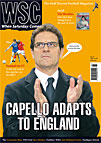 The BBC so was so keen to snap up the rights for Formula One that it seems to have forgotten about the football, writes Paul Hopwood
The BBC so was so keen to snap up the rights for Formula One that it seems to have forgotten about the football, writes Paul Hopwood
The music’s stopped and the latest round of “Pass the Rights” has ground to a halt. So, who has grabbed the chairs – and who’s left looking faintly ridiculous around the edge of the room? Well, we already knew that live Premier League fixtures would be shown, for two more seasons, by a combination of Sky and Setanta, with the BBC left with Saturday’s smug Match of the Day and an altogether more watchable edition on Sunday.
The FA’s rights to the FA Cup and home England matches from 2008-09 were won last year by a joint bid from ITV and Setanta. The Carling Cup will be on Sky, bar one semi-final live on the BBC, who will simulcast the final. Sky will also have extensive Football League coverage, although there will be ten live Championship matches each season on the BBC. If you can hear Gary Lineker imploring us to join him for exclusive coverage of Blackpool and Plymouth, you should seek medical assistance.
So what else is there? The concluding stages of the UEFA Cup are contracted to ITV, with early rounds negotiated by the home club and shown mainly on Five. Setanta will have the Conference, the SPL and sundry footballing ballast from all over Europe. Sky will showcase La Liga – or at least Real Madrid, Barcelona and their respective victims – while Five own the rights to a weekly live game from Serie A.
Which left the final, fiercely contested piece of the jigsaw – the Champions League. Would it be Sky, who cannot afford to lose any more rights to Setanta without subscription levels coming under threat, ITV, or the BBC, now in severe danger of being left with no credible live football? TEAM, the marketing agents employed by UEFA, soon announced that everything had gone to Sky. Everything, that is, with the exception of the prime Wednesday night “first-pick” fixture, which would be subject to a further round of bidding, also covering highlights.
On the day that the decision was to be made, the BBC shocked the broadcast world by paying £200 million over five years to wrench control of Formula One away from ITV, less than halfway through their current contract. This changed everything. ITV now had significant savings from F1 to throw at the Champions League. But it still left the BBC with no serious live football; although the odd Lewis Hamilton podium appearance will be popular enough, it’s not exactly Arsenal against Real Madrid.
The announcement came later that day. ITV, with a killer bid believed to total £160m over three years, had clinched 15 live Wednesday fixtures each season. Quite how it would deal with Coronation Street, currently transmitted at 7.30pm every Wednesday to an audience roughly double the size of that attracted by Champions League football, was not revealed. Not to worry, though, the jigsaw was complete.
However, no sooner had the ITV negotiation team popped open the Moët than rumours began circulating. The BBC had apparently signed a non-disclosure agreement so was unable to comment on a story suggesting that far from ITV pipping the Corporation in a battle of bulging budgets, there had actually been no BBC Champions League bid at all. We’ll never know what really went on, but the upshot is clear. The national broadcaster will be providing no significant live coverage of the national sport. And that can’t be right.
The BBC recently extended its Wimbledon contract until 2014 and also has rights to, among others, Six Nations rugby, the Winter and Summer Olympics, the Open golf and the Grand National. It’s all good stuff, but simply not the main event. Sporadic tournaments, such as shared coverage of Euro 2008, won’t fill the gap. Grandstand has gone, so what to do with Lineker and his reported £2m annual salary? No wonder he has that permanent smirk.
And what of ITV? It will certainly have some football – although only one Champions League game every match-week against two at present – but heavily skewed towards the inevitable Big Four, backed up by some coverage of the national team. Not exactly representative of the broad appeal of the game. Viewers end up better-served than ever – but only those prepared, or able, to pay. For the remainder, terrestrial pickings are looking distinctly thin.
The winners can only be Sky. BBC, bidding from a licence-fee pot growing at less than inflation, and ITV, using advertisers’ money at a time when promotional TV budgets are under scrutiny as never before, can’t compete with the subscription revenue at Sky’s disposal. Work it out – more than eight million homes, each paying an average of £400-plus per year. It’s an entirely different business model, which will remain unchallenged, at least until a major multinational broadcaster – such as ESPN – chooses to get involved.
Of course the acid test will come should Premier League clubs ever break rank and negotiate deals for their own home games. Their next auction for collective rights begins early next year. You might start putting a few quid aside.
From WSC 255 May 2008